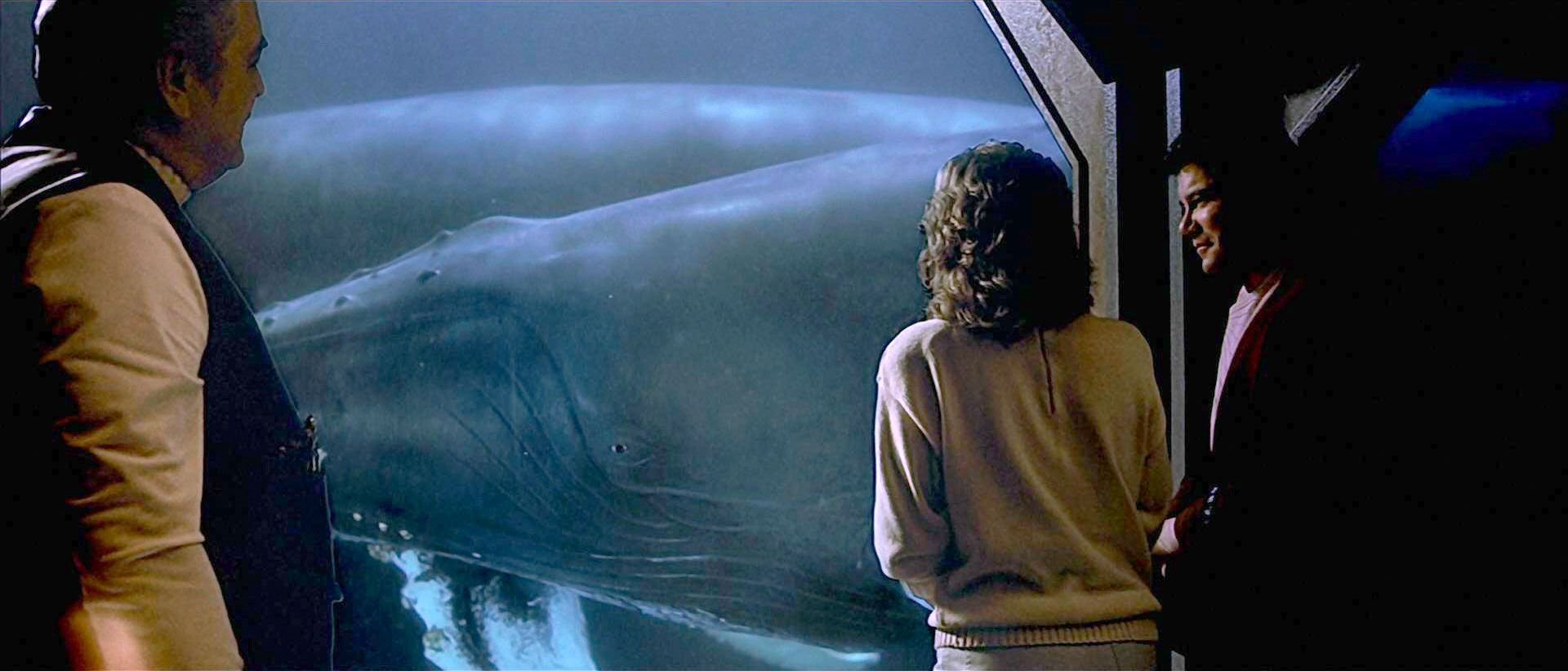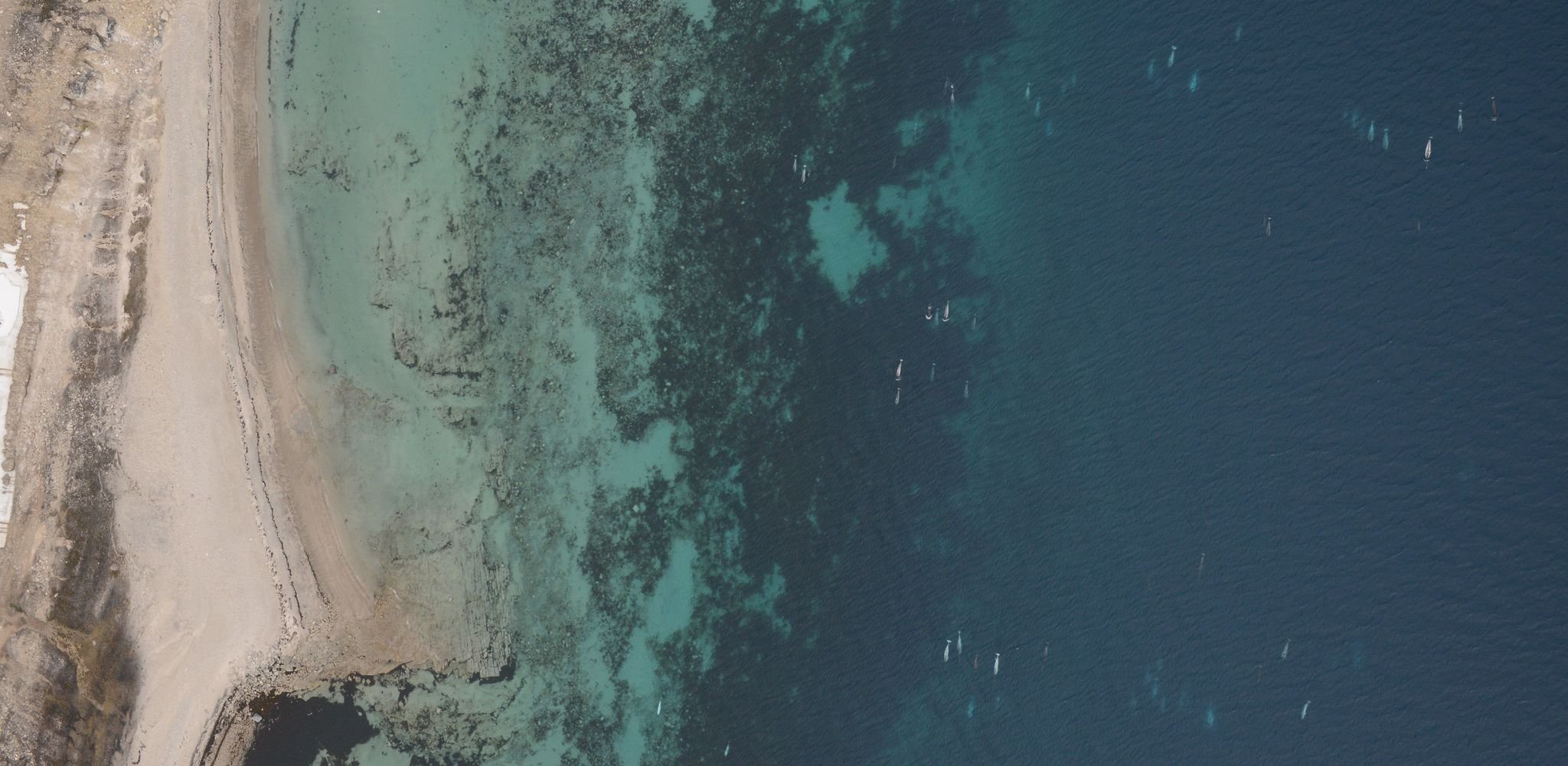Why Our Journey to Space is also Our Voyage Home
One of the top environmentally-themed movies of all time was also a movie about space travel. November marks the 35th anniversary of a blockbuster film about a diverse group of 23rd-century astronauts saving Earth from the 20th-century’s ecological short-sightedness.
Kirk saves the whales—and humanity along with them. Paramount.
The ecological catastrophe? The unanticipated consequences of hunting a species—humpback whales—to extinction.
The astronauts? James T. Kirk and crew.
The result? In the fictional Star Trek universe, a breeding pair of humpback whales were saved from extinction and Earth was saved along with them.
The implication? First, that the curiosity that drives us to explore the final frontier can be a force for valuing what we have right here on Earth. Second, that the technology that takes us to space can provide the tools we use to save the planet we live on.
It is fitting that as we approach the 35th anniversary of Star Trek IV, 90-year-old William Shatner, Captain Kirk himself, became the oldest person in space. And since returning he has appealed to leaders to protect this planet for future generations.
Can the space industries of the 21st-century be part of the solution to the pressing environmental issues we’ve inherited from the 20th-century?
Measuring (and Managing) Life on Earth
“The future of everybody’s life on this planet right now is affected by the climate,” said Andrew Freedman, Energy and Climate Reporter at Axios. But to measure and manage that threat, Freedman points out we need the right tools. “We wouldn’t be able to understand the climate system and climate change without satellites.”
In other words, going to space is an indispensable part of understanding and saving our Earth.
For Emiliano Kargieman, CEO and Founder of Satellogic, it was an interest in solving some of the greatest challenges on Earth that led him to space. Specifically, he saw the powerful advantage of gathering Earth Observation (EO) data using high-resolution satellite technology.
“The future of everybody’s life on this planet right now is affected by the climate. We wouldn’t be able to understand the climate system and climate change without satellites.”
He found that traditional methods of gathering data—such as the use of planes, helicopters, or boots on the ground—are typically costly. Additionally, the data acquired is generally too fragmented to make global decisions about global issues. Not to mention these methods can have their own negative impact on the environments they are intended to study.
“Satellite imagery gives us an incredibly valuable vantage point,” Kargieman said. “EO data is an affordable, scalable source of insight to identify at-risk environments, assess damage, plan effective restoration solutions, and monitor progress.”
Kargieman’s company Satellogic currently has a constellation of 17 satellites in orbit, each named after remarkable women in STEM, and a roadmap to increase that to 60 satellites by 2023. He notes that high-resolution satellite data not only has the power to inform environmental policy, it can help with the enforcement of those policies as well.
“For large industrial sites that must adhere to environmental regulations,” Kargieman said, “EO data can help monitor operations as well as provide proof of compliance conformance to oversight agencies and stakeholders.”
The impact of space technology on environmental efforts here on Earth is more than theoretical or a future-facing projection. Consider some real world benefits space industries are already bringing to Earth.
Narwhals in the Canadian Arctic. Courtesy Whale Seeker, Inc.
Photo credit: Department of Fisheries and Oceans Canada.
Bringing the Benefits Down to Earth
Fighting Wildfires: While wildfires can create visibility problems for planes and helicopters, high resolution satellite data is being used to guide decision making on wildfire response. Current satellite systems allow hourly updates to the High-Resolution Rapid Refresh-Smoke forecast model. Fire crews consult this data when deciding where to pitch base camps or to stage resources. and it has become “a vital resource for fire crews, air traffic controllers, local forecasters, and even school administrators.”
Reducing Fuel Consumption: While the average driver may view GPS technology as simply a convenient way to boost their confidence navigating to an unfamiliar destination, the large-scale benefits of GPS to the environment are much more impressive. “The efficiency gains of GPS-guided navigation shrink fuel expenditures on sea, land, and air by between 15 and 21 percent,” explains Dr. Greg Autry of Arizona State University, “a greater reduction than better engines or fuel changes have so far provided.”
Saving the Whales: And yes, space technology is even being used to save the whales. The Montreal-based startup Whale Seeker is supporting its efforts to help whales thrive using high-resolution satellite imagery as a non-invasive way to track the movements of belugas and narwhals. Captain Kirk would be proud.
How else can space exploration benefit decision making right here on Earth?
William Shatner looks out of the New Shepard windows on NS-18. October 13, 2021. Credit: Blue Origin
The Critical Need for Ethical Decision-Making
It is fitting that Star Trek IV bears the title The Voyage Home. It is very much a story about coming home and saving our home. At the end of the film the President of the United Federation of Planets, says, “Captain Kirk, you and your crew have saved this planet from its own short-sightedness, and we are forever in your debt.”
Will our current generation of space explorers—including a growing number of civilians—be able to do the same?
Whether this planet is saved from our own short-sightedness depends greatly on decisions being made by leaders in the public and private sector on a daily basis. Some decisions are strictly focused on terrestrial concerns. Others are focused on the rapidly evolving field of space policy as the International Space Station inevitably reaches the end of its lifespan and new players enter the global space economy.
“I was moved to tears by what I saw—I came back overwhelmed by sadness and empathy for this beautiful thing we call Earth.”
What ideals will shape those decisions now and in the coming decades? An awe-inspiring experience, such as seeing Earth from obit, may be exactly what our leaders need.
The research of Paul K Piff of the University of California and others demonstrates that feelings of awe promote prosocial behavior. A study published in 2015 states that experiencing feelings of awe “predicted greater generosity…increased ethical decision-making….enhanced prosocial helping behavior and decreased entitlement.”
Those sound like the leadership traits Earth desperately needs.
Seeing Earth from space is a profound experience that takes such feelings of awe to a whole new level. Space philosopher Frank White calls this the Overview Effect: the worldview shift astronauts experience when they see the beauty, wholeness, and interconnectedness of our home planet.
The power of the Overview Effect was certainly not lost on William Shatner.
“I was moved to tears by what I saw,” Shatner said, “I came back overwhelmed by sadness and empathy for this beautiful thing we call earth,” In an interview with CNN he lamented the inability of leaders to see beyond their own self-interest and protect this precious planet we call home.
If even a small percentage of leaders could go to space and come back with this perspective, we might just be able to heal our relationship with Earth and each other.
As Frank White explains: “I hope people will come to understand that space exploration is not about escaping Earth but is about coming to appreciate her more fully.”
From this perspective, space exploration is not about an exit plan.
It is a vital means of protecting and preserving what we have.




